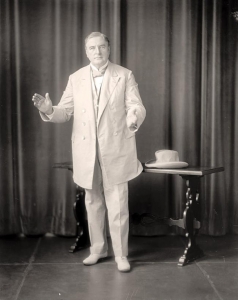By Diane McWhorter | Originally Published at The New York Times. May 8, 1994 | Photographic Credit; Heflin, J. Thomas. Senator. Image circa approximately 1905 -1945 by Harris & Ewing
Let the historical record speak for itself.
 The House resolution that led President Woodrow Wilson in 1914 to proclaim the second Sunday in May Mother’s Day was the only memorable accomplishment in the 26-year career of the biggest boob in the history of Congress. He may also have been the most shameless racist.
The House resolution that led President Woodrow Wilson in 1914 to proclaim the second Sunday in May Mother’s Day was the only memorable accomplishment in the 26-year career of the biggest boob in the history of Congress. He may also have been the most shameless racist.
J. Thomas Heflin of Alabama served in the House from 1904 to 1920 and the Senate for 10 years after that. “Cotton Tom” was a walking editorial cartoon of the yahoo nabob, a great bus of a man in white frock coat, outsize bow tie, pointy shoes and candy-striped socks.
Another nickname, Tom-Tom, presumably alluded to his gallery-packing oratory, which featured moos, cock-a-doodle-doos and the obligatory “Negro dialect.”
To point out that Tom Heflin was a member of the Ku Klux Klan does him too much justice. The Alabama Klan of the 1920’s was the insurgent populist wing of the Democratic Party, which launched such liberal politicians as Hugo Black. Heflin was a demagogue uncorrupted by ideology.
He was very high on womanhood, however — provided that it was preceded by “sacred white.” In the 1930’s, he championed two famous oppressed females against “vile despoilers of our precious white women”: the unemployed mill workers who defined an epoch in American race relations by leveling false charges of rape against nine black youths, the Scottsboro Boys. Not long after arriving in Washington, the Congressman had shot and wounded a black man for “insulting” a white woman on a streetcar.
Mother’s Day was not Tom Heflin’s idea, of course. The creator was Anna Jarvis of Philadelphia, who mounted a one-woman letter-writing campaign to lawmakers, editors and heads of state after her mother died in 1905. Jarvis’s sentimental obsession caught Heflin’s ear above the din of the era’s suffragists. He voted against their cause, the 19th Amendment, a few years after his legislative favor to Jarvis.
Jarvis soon threw her own militant energies into anti-capitalist crusades against the confectioners, greeting-card interests and carnation profiteers she felt were exploiting her day. Her inheritance dissipated, she spent her last years, blind and destitute, in a sanatorium room swamped once a year with the mass-produced Mother’s Day wishes she abhorred. She died, at 84, in 1948.
Heflin too was frustrated. He was defeated for re-election in 1930, after the Democratic regulars read him out of the party for rallying Alabama Klansmen against “that hireling of the Pope,” the 1928 Presidential candidate Al Smith. Though that rebellion would secure his place in history, he insisted toward the end of his 82 years that Mother’s Day was the high point of his career.
He may have had a point: his fond obituary in the May 7, 1951, issue of Life magazine was surrounded by tributes to his achievement. Full-page ads plied gift ideas for the coming Sunday observance — a Playtex pillow, a Hoover vacuum cleaner (“Let your instinct lead you to it”) and the archetypal Whitman’s Sampler.
Life wrote of Cotton Tom (uncle of Howell Heflin, now Alabama’s senior Senator), “You might say that his only lasting service was in being around long enough to be outgrown.” Maybe that is all that needs to be said of Mother’s Day.
Diane McWhorter is
This piece was reprinted by EmpathyEducates with permission or license. We thank the Author, Diane McWhorter for her kindness, observations, research and for what we believe is a vital reflection.











Leave A Comment